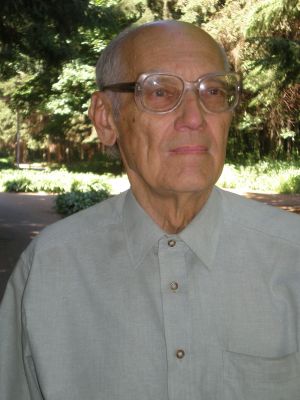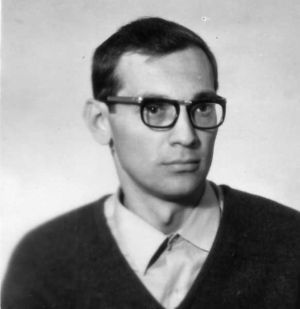Chemist, Doctor of Technical Sciences, imprisoned for his poetry.
His father, Feodosiy Ivanovych (1896-1977), from Volyn, came from a poor family, had a 5th-grade education, was a participant in World War I, a signalman, and served in Petliura’s UNR army; after the war, he served in the Red Army. He worked as a lumberjack, a club manager, and a village council secretary. His mother, Maria Mykytivna Ihnatenko (1897–1996), had a first-grade education. They had four children. They were collective farmers.
Ivan studied at the Dorohyntsi seven-year school and at Fastiv Secondary School No. 5. He wrote poetry even as a schoolboy. Since his parents sang beautifully, their son also participated in amateur arts for many years. In 1954, he enrolled in the Faculty of Chemical Technology at the Kyiv Polytechnic Institute, from which he graduated with honors in 1959. He wrote his diploma thesis—perhaps the only one at KPI—in Ukrainian. For 5 years, he worked at the Vinnytsia Chemical Plant as a shift supervisor and research engineer. When a film about Lesia Ukrainka was shown in Russian in Vinnytsia, M. protested at a Komsomol meeting. He conducted political information sessions in Ukrainian. He was interested in the history of Ukraine. By 1964, he had identified the Trypillian culture as Ukrainian and as the center of Aryan civilization.
In 1964, he entered postgraduate studies at the Taras Shevchenko National University of Kyiv. Under the supervision of Professor Andriy Matviyovych Holub, head of the Department of Inorganic Chemistry, he prepared a dissertation based on the technology of extracting strontium and rare-earth elements from apatite concentrate. This was a relevant topic and was accepted for pilot testing in the city of Dniprodzerzhynsk. M. developed data for the production design, coordinated the ordering of equipment, installation, and managed the testing. He was supposed to be sent to Kazakhstan, to the Ust-Kamenogorsk Construction and Road Institute, but at the insistence of Prof. A.M. Holub and the Ministry of Chemical Industry of Ukraine, he was kept at Kyiv State University as the main executor of the rare-earth elements and strontium project, which was approved for implementation. He defended his dissertation for the degree of Candidate of Technical Sciences at the Kharkiv Polytechnic Institute in 1972.
In 1984, to mark the 20th anniversary of his work at Kyiv State University, M. collected and typed up a selection of his poems. In some of them, he condemned national oppression and communist doctrines. These poems, in his words, were a remedy for painful civic feelings and the overload of scientific work, the insights in which “held courage.” Apparently, someone informed the KGB about the collection.
On February 14, 1985, an investigator from the prosecutor’s office of the Moskovskyi district of Kyiv, V.N. Shokin, conducted a search of M.’s apartment on Lomonosova Street in connection with a theft at one of the nearby student dormitories (where M. had supposedly been seen). An operative immediately reached into a wardrobe and pulled out a collection of poems held together with a paperclip. Seeing a large map of Ukraine on the wall, another officer said, “Oh, this one’s a nationalist.” M. was interrogated at the Moskovskyi district prosecutor’s office. The materials from the search were apparently handed over to the KGB.
On July 16, 1985, just as M. was about to go on vacation, another search. It was conducted by KGB investigator A.I. Ilchenko. That same day, M. was arrested. He was held in the pre-trial detention center in Lukianivka. Within two months, investigator Ilchenko had compiled the charges: “on the basis of nationalist convictions and an incorrect perception of Soviet reality, for a long time, he produced and distributed documents containing deliberately false fabrications that defame the Soviet state and social system,” Article 187-1 of the Criminal Code of the Ukrainian SSR. These “documents” were six poems, two letters to newspapers in defense of the Maria Zankovetska Museum, and one leaflet, “Glory to the Hero Marchenko” (about Valeriy MARCHENKO). The criminal lines of the poems were: “We are the last slaves in the herd with the Bolsheviks,” “Praise to you, heroes, for the glory of Ukraine,” “He who acts with the certainty that the authorities are our enemy will be able to save himself in the future,” “Moscow is not burned, the communists are not in cages,” and others. Although these poems and letters had not been distributed in any way, they were, as it turned out, a greater danger to society than the loss of a rare (if not unique!) specialist in the extraction of rare-earth elements and strontium from apatite.
M. admitted to being the author of the poems and the letters to the newspapers but did not believe they defamed the Soviet state and social system (i.e., he pleaded partially guilty); he categorically denied authoring and distributing the leaflet on the university premises. On October 28, 1985, he was sentenced by the Kyiv City Court, presided over by H.I. Zubets with prosecutor L.M. Abramenko, to 3 years of imprisonment in general-regime corrective labor colonies. By a decision of the Collegium of the VAK on August 13, 1986 (possibly at the request of Kyiv State University), M. was stripped of his academic degree of Candidate of Technical Sciences and the title of senior researcher.
From the end of 1985, he was held in general-regime colony OP-317/16, p/v Kriukove near Poltava. The conditions were standard: overcrowding in the barracks, frequent inspections, drill, lice, cleaning duties, vulgar language, constant nervous tension, and unpredictable threats from other convicts. The food cost 40 kopecks per day. He had one visit with his mother and sister.
Initially, M. was assigned to winding electric motor coils, where he could not meet the production quota. He was warned that if he wrote anything or violated the regime, the newly introduced Article 183-3 of the Criminal Code of the Ukrainian SSR (“Malicious Disobedience to the Demands of the Administration of Corrective Labor Institutions”) would be applied, and he would never be released. Upon learning of his profession, he was transferred to the electroplating department (the enterprise of this zone was a division of the Poltava Radio Plant). The colony and unit commanders valued M. as a specialist, so they did not recommend him for parole.
In connection with the beginning of “perestroika” and M. Gorbachev’s statements that there were no political prisoners in the USSR, the Poltava KGB officers tried to persuade M. to write a statement of repentance admitting his guilt and promised his immediate release, but he did not submit such a statement. Nevertheless, on June 3, 1987, the Poltava district people’s court, based on Article 52 of the Criminal Code of the Ukrainian SSR, granted him parole 1 year, 1 month, and 13 days ahead of schedule and placed him under the supervision of the labor collective of the Lepse Kyiv Plant, as the rector of Kyiv State University, V.V. Skopenko, was against M.’s return to the university. Letter No. 30 dated April 7, 1987, regarding assistance with his employment was sent to the colony chief from the Kyiv city employment bureau at the request of V.V. Kosenko, head of the chemistry department of the State Planning Committee of Ukraine, and Academician F.S. Babychev, who had arranged with the director of the Lepse plant, V.F. Zlobin, that M. would be hired in the plant’s research department.
On June 9, 1987, M. was registered with the militsiya (police). On June 23, 1987, his propiska (residence permit) was restored (his apartment had been preserved). M. worked as an engineer at the Lepse plant for 5 years, starting on July 14, 1987. He successfully developed coatings for pistons, liners, and molds.
On January 2, 1992, he was rehabilitated under the Law of the Ukrainian SSR of April 17, 1991, “On the Rehabilitation of Victims of Political Repression in Ukraine.” That same year, M. began working as a researcher at the National Agrarian University. His main scientific work is related to the problem of exhaustive use of mineral raw materials, namely phosphorus and potassium, with the extraction of rare elements, fluorine, chlorine, etc., from these raw materials, along with the simultaneous production of fertilizers. His work has received international recognition. In conditions of financial hardship, his approach to simplified processing of new local phosphorus and potassium raw materials through solid-phase processes, decomposing the raw material in granules without significant capital investment, also gained recognition.
He defended his doctoral dissertation, “Development of Technologies for the Chemical Complex Processing of Apatites and Potassium Chloride,” on April 3, 1996, at the National Technical University “Kyiv Polytechnic Institute.” He retired in 2004.
M. is the author of 28 author’s certificates and patents, 107 publications, 12 factory installations and processes, and the editor of several scientific publications. He is a proponent of subordinating production to science, viewing production as a science.
He continues his research into Ukrainian antiquity. He is developing his own concept of Dobroslavia as a religion. In his parents’ homestead in the village of Dorohyntsi, he has set up a museum of antiquities, where he has collected agricultural tools and household items, and created a shrine to Dobroslavia. He lives in Kyiv.
Bibliography:
[A selection of poems] // From the Siege of Night: A Collection of Ukraine’s Prison Poetry, 30s–80s / Comp. M.O. Samiylenko. – Kyiv: Ukr. pysmennyk, 1993. – pp. 248–261.
[A selection of poems] // Words from a Sincere Heart. – Kyiv: Gnozis, 1998. – pp. 206–208.
New Generation of Chemical Complexes for Processing Apatites and Phosphorites. – Kyiv: NAU, 1998. – 82 pp.
Solid-Phase Production of Mineral Salts. – Kyiv: NAU, 1998. – 236 pp.
Fundamentals of Production. – Kyiv: NAU, 2001. – 268 pp.
Evaluation of Mineral Raw Materials Based on the Natural Mass Equivalence of Chemical Elements. – Kyiv: NAU, 2003. – 265 pp.
Chronicle. – Kyiv, 2009. – 190 pp.
Chronicle (second, supplemented edition). – Fastiv: Polifast, 2010. – 176 pp.
Dobroslavia (The Foundations of the State Doctrine and Spiritual Authority of Ukraine). – Fastiv: Polifast, 2010. – 424 pp.
KhPG Archive: autobiographical interview, June 7, 2011.
V. Ovsiienko, Kharkiv Human Rights Protection Group, June 20, 2011.

MULIARCHUK IVAN FEODOSIYOVYCH

MULIARCHUK IVAN FEODOSIYOVYCH